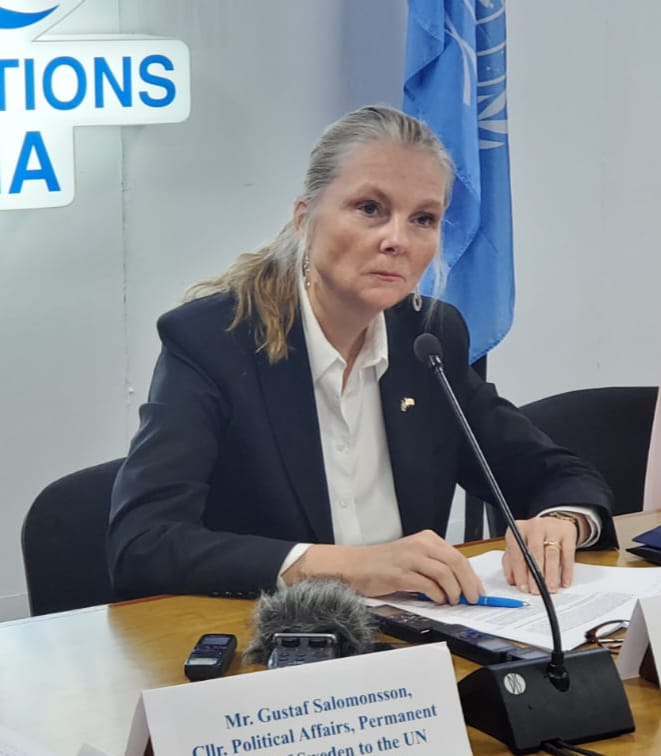On November 26, 2024, during a press conference at the United Nations Headquarters in Sinkor, Liberia, Mrs. Nicola Clase, the Permanent Representative of Sweden to the UN and Chair of the UN Peacebuilding Commission’s Liberia Configuration, reaffirmed the organization’s commitment to supporting Liberia’s ongoing peacebuilding efforts. She highlighted the transition from decades of civil conflict to a stable society as a significant achievement. Mrs. Clase noted that since the establishment of Sweden’s leadership of the Liberia Configuration in 2012, there has been a focused effort to assist Liberia in its quest for sustainable peace, emphasizing the importance of ongoing support to transition towards a prosperous future. Her recent visit marked her debut trip to Liberia since assuming her role, and she expressed her eagerness to enhance engagement with various stakeholders across the nation.
During her five-day visit, Mrs. Clase engaged with a wide range of stakeholders including government officials, law enforcement agencies, the UN Country Team, civil society organizations, women’s groups, and youth leaders, emphasizing the collaborative nature required for effective peacebuilding. She visited both Monrovia and Bong County, where she was met with warmth and hospitality from the Liberian citizens. This engagement reinforced her message of unity and the need for collective action as the country continues its journey toward stability and growth. Her positive reception highlighted the potential among the Liberian populace, especially the youth, whose involvement in peace efforts is crucial for the nation’s future.
Mrs. Clase praised the strong commitment to peace shown by Liberia, highlighting the success of recent elections as a testament to this determination. She expressed optimism regarding the desire of Liberians to turn enduring peace into opportunities for economic development, acknowledging the pivotal role played by the youth in this regard. She underscored the need for transforming the energy and determination of young people into a constructive force that can drive the nation towards growth and stability. By harnessing the potential of youth, Liberia can cultivate a sense of ownership in the peacebuilding process, which is essential for long-term success.
In addressing the significance of integrating peacebuilding with development, Mrs. Clase advocated for substantial investments in educational opportunities for individuals of all ages, particularly children and youth. Her visit to a women’s peace hut and interactions with women’s groups underscored the crucial role women have played in shaping Liberia’s peace narrative. She acknowledged their invaluable contributions to ending the civil war and their ongoing involvement in fostering sustainable development and lasting peace. By empowering women through education and economic opportunities, Liberia can ensure a balanced and inclusive approach to development.
While recognizing progress, Mrs. Clase also highlighted the ongoing challenges faced by women in Liberia, particularly regarding their economic and political participation, protection from sexual and gender-based violence, and access to essential services. She stressed the importance of addressing these issues as part of Liberia’s peacebuilding journey. The UN, with Sweden’s leadership, aims to amplify its efforts to support women’s rights and facilitate their active participation in governance and peace initiatives, thus paving the way for a more equitable society.
Ultimately, Mrs. Clase reaffirmed the UN’s commitment to Liberia’s peacebuilding efforts, emphasizing the necessity for collaboration among government, civil society, and international partners. Her visit aimed to solidify these relationships and foster a collective approach to addressing the multifaceted challenges that remain. The UN’s ongoing support is crucial for Liberia as it works to consolidate peace, promote development, and harness the potential of its youth and women to create a more inclusive and prosperous future.


